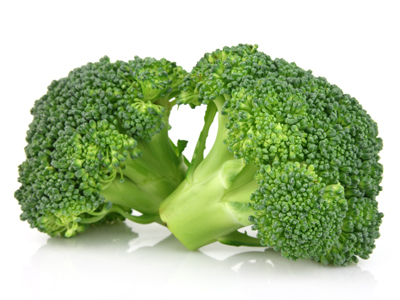
Health Benefits
Broccoli is a member of the cabbage family. It is more nutritious than its cruciferous cousins, such as Brussels sprouts, cauliflower, collards, kale, and bok choy. All of these veggies contain nitrogen compounds called indoles, which aid in preventing cancerous tumors of the stomach, prostate, and breast. But broccoli contains exceptionally high amounts of enzymes and nutrients, such as carotenoids, that sweep up cancer-promoting free radicals. In addition, it's rich in calcium, fiber, vitamin C, folate, riboflavin, potassium, and iron. It's a superfood, to be sure, and a defensive powerhouse!
Buy
Young, fresh-picked broccoli with tightly closed and uniformly green florets are best. The stalks should snap crisply. When cooked, overly mature broccoli is tough and woody and will emit a sulfurous cabbage odor. Yellowing florets are an indication that broccoli is past its prime.
Store
Refrigerate in a perforated plastic bag in the vegetable drawer for up to five days. Plastic vegetable bags from the produce department or a gallon-size zip-lock bag would work great. Just snip a few slits along the sides to allow air to circulate.
Prepare
You can enjoy raw broccoli in salads, served with other vegetables on a veggie tray, or its own as a healthy snack. Beyond that, steaming is the most nutritious way to prepare broccoli. Boiling, microwaving, and stir-frying compromise many nutrients, so if you're eating broccoli for its health benefit, prepare and enjoy it raw or steamed. Cook in a basket or colander, covered, over simmering water until tender, about 5 to 7 minutes. Most people cut the stalk and leaves away and discard them; we suggest you go ahead and cook them as they contain abundant nutrients. Peel the stalks before cooking for best results. Refrigerate any leftovers.
Did you know?
Broccoli has grown in America for roughly 200 years. The first commercially grown broccoli crop was harvested in New York and planted in California in the 1920s.
Read next about the amazing health benefits of Brussels Sprouts.
